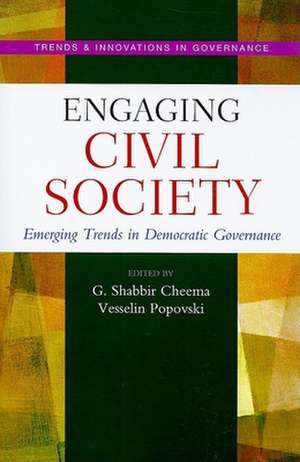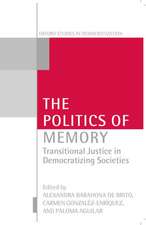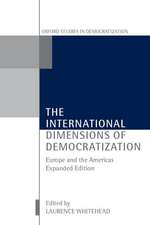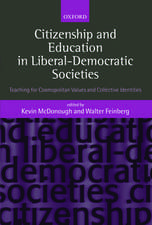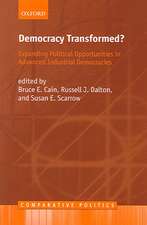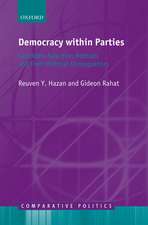Engaging Civil Society: Emerging Trends in Democratic Governance: Trends and Innovations in Governance Series
Editat de G. Shabbir Cheema, Vesselin Popovskien Limba Engleză Paperback – 6 iul 2010
The rapid pace of globalization has led to the increasing interdependence of member states of the United Nations to achieve sustainable development objectives, including the eradication of extreme poverty, environmental protection, access to basic services and livelihoods, and the promotion of economic growth and opportunities.
Policymakers, scholars, and development practitioners recognize the centrality of effective governance at the local, national, and global levels to promote sustainable development. Along with governments and the private sector, civil society organizations (CSOs) are playing an expanded role in improving transparency, participation, access to services, and the rule of law.
This book looks at the changing roles of civil society in global and national governance. It identifies factors that influence the effectiveness of civil society in promoting democratic governance. It asks: To what extent and how has the global civil society been influencing global governance and democratic change? What have been the patterns of growth of civil society in Asia and Africa, including the legal frameworks under which CSOs are established? How and with what effect has civil society been engaged in promoting democratic change and inclusive governance?
Contributors include William Ascher (Claremont McKenna College and Soka University of America), Robertson Work (Innovative Leadership Services and New York University), Denny Roy (East-West Center), Kadmiel Harrison Wekwete (United Nations Capital Development Fund), Denison Jayasooria (Universiti Kebangsaan Malaysia and Human Rights Commission of Malaysia), Jin Sato (University of Tokyo), Ahmed Bilal Mehboob, (Pakistan Institute of Legislative Development and Transparency), John Clark (The Policy Practice), Goran Hyden (University of Florida), Naresh Singh (Canadian International Development Agency), L. David Brown (Harvard University), Rehman Sobhan (Centre for Policy Dialogue, Bangladesh), and Massimo Tommasoli (Permanent Observer for International IDEA to the United Nations).
Policymakers, scholars, and development practitioners recognize the centrality of effective governance at the local, national, and global levels to promote sustainable development. Along with governments and the private sector, civil society organizations (CSOs) are playing an expanded role in improving transparency, participation, access to services, and the rule of law.
This book looks at the changing roles of civil society in global and national governance. It identifies factors that influence the effectiveness of civil society in promoting democratic governance. It asks: To what extent and how has the global civil society been influencing global governance and democratic change? What have been the patterns of growth of civil society in Asia and Africa, including the legal frameworks under which CSOs are established? How and with what effect has civil society been engaged in promoting democratic change and inclusive governance?
Contributors include William Ascher (Claremont McKenna College and Soka University of America), Robertson Work (Innovative Leadership Services and New York University), Denny Roy (East-West Center), Kadmiel Harrison Wekwete (United Nations Capital Development Fund), Denison Jayasooria (Universiti Kebangsaan Malaysia and Human Rights Commission of Malaysia), Jin Sato (University of Tokyo), Ahmed Bilal Mehboob, (Pakistan Institute of Legislative Development and Transparency), John Clark (The Policy Practice), Goran Hyden (University of Florida), Naresh Singh (Canadian International Development Agency), L. David Brown (Harvard University), Rehman Sobhan (Centre for Policy Dialogue, Bangladesh), and Massimo Tommasoli (Permanent Observer for International IDEA to the United Nations).
Preț: 278.46 lei
Nou
Puncte Express: 418
Preț estimativ în valută:
53.28€ • 55.63$ • 44.10£
53.28€ • 55.63$ • 44.10£
Carte tipărită la comandă
Livrare economică 04-18 aprilie
Preluare comenzi: 021 569.72.76
Specificații
ISBN-13: 9789280811889
ISBN-10: 9280811886
Pagini: 308
Dimensiuni: 152 x 229 x 23 mm
Greutate: 0.48 kg
Editura: Brookings Institution Press
Colecția United Nations University Press
Seria Trends and Innovations in Governance Series
ISBN-10: 9280811886
Pagini: 308
Dimensiuni: 152 x 229 x 23 mm
Greutate: 0.48 kg
Editura: Brookings Institution Press
Colecția United Nations University Press
Seria Trends and Innovations in Governance Series
Notă biografică
G. Shabbir Cheema is director of the Asia-Pacific Governance and Democracy Initiative and senior fellow at the East-West Center, Hawaii.
Vesselin Popovski is senior academic program officer and head of section for peace and security in the Institute for Sustainability and Peace at the United Nations University.
Vesselin Popovski is senior academic program officer and head of section for peace and security in the Institute for Sustainability and Peace at the United Nations University.
Descriere
The rapid pace of globalization has led to the increasing interdependence of member states of the United Nations to achieve sustainable development objectives, including the eradication of extreme poverty, environmental protection, access to basic services and livelihoods, and the promotion of economic growth and opportunities.
Policymakers, scholars, and development practitioners recognize the centrality of effective governance at the local, national, and global levels to promote sustainable development. Along with governments and the private sector, civil society organizations (CSOs) are playing an expanded role in improving transparency, participation, access to services, and the rule of law.
This book looks at the changing roles of civil society in global and national governance. It identifies factors that influence the effectiveness of civil society in promoting democratic governance. It asks: To what extent and how has the global civil society been influencing global governance and democratic change? What have been the patterns of growth of civil society in Asia and Africa, including the legal frameworks under which CSOs are established? How and with what effect has civil society been engaged in promoting democratic change and inclusive governance?
Contributors include William Ascher (Claremont McKenna College and Soka University of America), Robertson Work (Innovative Leadership Services and New York University), Denny Roy (East-West Center), Kadmiel Harrison Wekwete (United Nations Capital Development Fund), Denison Jayasooria (Universiti Kebangsaan Malaysia and Human Rights Commission of Malaysia), Jin Sato (University of Tokyo), Ahmed Bilal Mehboob, (Pakistan Institute of Legislative Development and Transparency), John Clark (The Policy Practice), Goran Hyden (University of Florida), Naresh Singh (Canadian International Development Agency), L. David Brown (Harvard University), Rehman Sobhan (Centre for Policy Dialogue, Bangladesh)
Policymakers, scholars, and development practitioners recognize the centrality of effective governance at the local, national, and global levels to promote sustainable development. Along with governments and the private sector, civil society organizations (CSOs) are playing an expanded role in improving transparency, participation, access to services, and the rule of law.
This book looks at the changing roles of civil society in global and national governance. It identifies factors that influence the effectiveness of civil society in promoting democratic governance. It asks: To what extent and how has the global civil society been influencing global governance and democratic change? What have been the patterns of growth of civil society in Asia and Africa, including the legal frameworks under which CSOs are established? How and with what effect has civil society been engaged in promoting democratic change and inclusive governance?
Contributors include William Ascher (Claremont McKenna College and Soka University of America), Robertson Work (Innovative Leadership Services and New York University), Denny Roy (East-West Center), Kadmiel Harrison Wekwete (United Nations Capital Development Fund), Denison Jayasooria (Universiti Kebangsaan Malaysia and Human Rights Commission of Malaysia), Jin Sato (University of Tokyo), Ahmed Bilal Mehboob, (Pakistan Institute of Legislative Development and Transparency), John Clark (The Policy Practice), Goran Hyden (University of Florida), Naresh Singh (Canadian International Development Agency), L. David Brown (Harvard University), Rehman Sobhan (Centre for Policy Dialogue, Bangladesh)
